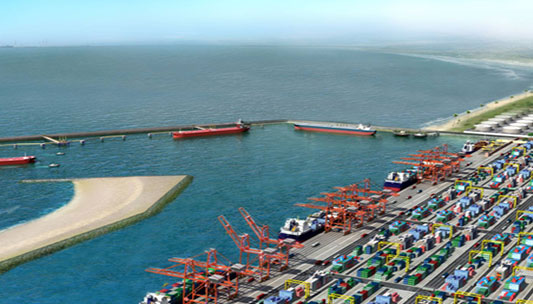The significance and impact of the Lekki Port operations in Nigeria is that the port gets closer to commencement of commercial service
By Uzor Odigbo
Managing Director of Nigerian Ports Authority, (NPA) Mohammed Bello-Koko with his management team joined by management of the Lekki Free Trade Zone, LFTZ and others to receive with joy the maiden vessel berth at the port.
The Vessel, ZHEN HUA 28, is owned by Shanghai Zhenhua Port Machinery (Hong Kong) Co., Ltd, Operated by Shanghai Zhenhua Shipping Co. Ltd, with Bolloré/Alraine as Agent.
The 35 year old vessel arrived the port with Shore to Shore and Rubber Gantry Cranes of 3nos and 10 nos respectively and other critical port equipment to facilitate commercial activities at the Lekki Deep Sea Port.
A visibly excited Bello Koko in welcoming the Vessel and her crew said “The arrival of this vessel is historic as it moves us a step closer to birthing Nigeria’s first Deep Seaport and also demonstrates our readiness to take trade facilitation a much higher”.
“The commitment of the Nigerian Ports Authority (NPA) to providing every support necessary to place Nigeria on the global list of countries with Deep Seaports is unflinching. This is why matters related to the operationalization of Lekki Deep Seaport before the end of this year have been placed on top priority”.
“Let me seize this moment to specially appreciate His Excellency President Muhammadu Buhari and the Federal Ministry of Transportation for the tremendous backing the NPA has enjoyed leading to this historic exercise”.
READ ALSO
Customers sue Union Bank over breach of contract, demand N407.8m
On the significance and impact of the Lekki Port on sea port operations in Nigeria as the port get closer to commencement of commercial service, the NPA boss said “For us at NPA, the coming on stream of Lekki Deep Sea Port symbolizes a lot of positives”. Apart from being Nigeria’s first Deep Seaport, Lekki Port will also be the first fully automated port at take-off.
“This provides an insight into the path we are already toeing as a management team to govern the operationalization of not just the forthcoming Badagry, Ibom and Bonny Deep Seaports, but also of the reconstruction of the aged Tin-Can Port, where work is set to commence once we secure the necessary approvals from the Federal Ministry of Transportation and Federal Executive Council, FEC, respectively”.
“Let me reiterate that automation remains the most veritable tool for assuring Port efficiency and as most of us are aware, NPA is working assiduously under the technical guidance of the International Maritime Organization to deploy the Port Community System (PCS), which will enable us respond squarely to the dictates of global trade facilitation and optimize the opportunities of the African Continental Free Trade Area (AfCFTA) Agreement to which Nigeria is signatory.
“Our strategic intent of becoming the maritime logistics hub for sustainable ports services in Africa rests heavily on how well we are able deepen our efficiencies through the construction of deep seaports in order to leverage the concomitant benefits of economies of scale”, Bello Koko said.
While thanking and congratulating stakeholders on the successful berthing of the first vessel at the Lekki Deep Sea Port, Mr. Mohammed Bello-Koko asked for their support and collaboration in efforts to facilitate trade in Nigeria.
Chairman of LFTZ, Mr. Abiodun Dabiri equally expressed his delight on the arrival of the cargo handling equipment. He thanked the federal and Lagos state government, NPA, China Harbour for their commitment to the development and operationalization of the port.
He was ecstatic that the arrival of this batch of equipment reaffirms the hope of the LFTZ management on the commencement of operations at the Lekki port before the end of the year.
Hopefully, with the upscale of events at the LDSP, attaining the elusive cargo hub status could become a reality and cargo diversion a thing of the past













